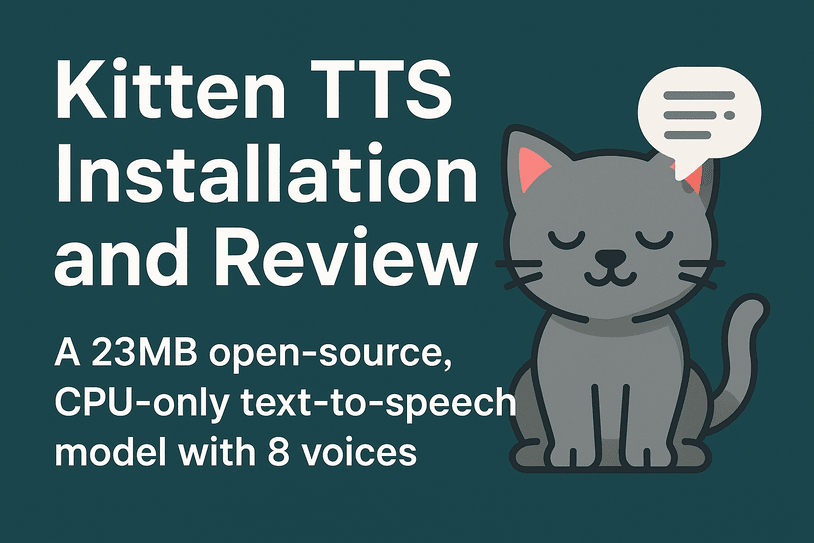What is Kitten TTS?
Kitten TTS is an ultra-lightweight text-to-speech (TTS) model, designed for environments where resources are limited or full-scale TTS models are unnecessary. At just 15 million parameters and ~23MB on disk, Kitten TTS is likely the smallest functional TTS model currently available.
Despite its size, Kitten TTS provides multiple expressive voice options, handles real-time synthesis on CPUs, and is completely open-source under the permissive Apache 2.0 license. It is especially ideal for developers experimenting with embedded AI, Raspberry Pi setups, or browser-based apps where inference speed and model size are critical.
Review: Is Kitten TTS Any Good?
✅ Pros:
- Ultra-Small Footprint: At 23MB, Kitten TTS can run on nearly any hardware — from laptops to Raspberry Pi to edge devices.
- No GPU Required: All inference is CPU-based, making it perfect for energy-efficient, low-cost deployment.
- 8 Prebuilt Voices: The model ships with four male and four female voices, each with a degree of expressive variation.
- Decent Speed: Voice generation is fast, often real-time or close to it on a standard CPU.
- Truly Offline: All processing is local, with no API calls required — ideal for privacy-conscious applications.
❌ Cons:
- Audio Quality: Some graininess, cutoffs, and artifacts are noticeable, especially in longer or more expressive sentences.
- Limited Language Support: Currently English-only; multilingual support is “coming soon” per the developers.
- No Emotion Control Yet: While voices are expressive, there’s no way to tune for emotion or prosody explicitly.
- Still in Preview: The model is functional but not production-hardened yet.
⚙️ How to Install Kitten TTS (Linux / CPU Setup)
Prerequisites:
- Python 3.8 or higher
- Ubuntu or Debian-based Linux OS
- Optional: Virtual environment
- No GPU required
1. Create a Virtual Environment (Recommended)
python3 -m venv kittenenv
source kittenenv/bin/activate
2. Clone and Install
Assuming it’s part of Mozilla’s TTS repo (or fork):
pip install https://github.com/KittenML/KittenTTS/releases/download/0.1/kittentts-0.1.0-py3-none-any.whl
git clone https://github.com/mozilla/TTS.git
cd TTS
pip install -r requirements.txt
python setup.py install
Alternatively, check the official Kitten TTS repo if they’ve released a separate model loader or Gradio UI.
🧪 Example Inference: Running Locally with Gradio
Create a simple Gradio interface using the model:
# app.py
import gradio as gr
from TTS.api import TTS
tts = TTS("tts_models/en/kitten-tts/nano", progress_bar=False, gpu=False)
def speak(text, voice):
return tts.tts(text, speaker=voice)
demo = gr.Interface(
fn=speak,
inputs=[gr.Text(label="Text"), gr.Radio(["1F", "2F", "3M", "4M"], label="Voice")],
outputs="audio"
)
demo.launch()
Then run:
python app.py
Visit: http://localhost:7860 to try it out.
📈 Kitten TTS Performance Notes
Even on modest hardware (dual-core CPUs or virtual machines), inference is relatively quick — under 2 seconds for standard sentences. VRAM or system memory usage remains under 1GB, and CPU usage is lightweight.
However, you may encounter:
- Incomplete outputs on long sentences
- Grainy or robotic audio, depending on voice selection and system load
- Lag in browser-based audio playback (likely a browser issue, not model-related)
📦 Use Cases for Kitten TTS
Kitten TTS is not designed to replace high-fidelity models like ElevenLabs, XTTS, or Bark, but its small size and permissive license open the door to many creative applications:
| Use Case | Why Kitten TTS Works Well |
|---|---|
| 🧩 Embedded Devices | Fits in <50MB total; no GPU |
| 🔐 Privacy-Centric Apps | Fully offline; no third-party APIs |
| 🧪 Rapid Prototyping | Quick to test UI/UX flows with voice |
| 🎓 Education | Perfect for classroom demos or CS labs |
| 🧠 AI Companions | Use with small LLMs for local agents |
| 🌐 Static Website Builders | Add local voice narration without cloud |
📝 Final Thoughts on Kitten TTS
Kitten TTS is an exciting advancement in compact, efficient speech synthesis. It proves that usable TTS doesn’t require large downloads or high-end GPUs. While the quality isn’t on par with the best models out there, for many low-power or lightweight use cases, it’s more than “good enough.”
As a preview release, it sets the stage for future lightweight models that balance performance, quality, and accessibility — and it’s already functional today.
⭐ Rating
| Category | Score |
|---|---|
| Audio Quality | ★★☆☆☆ |
| Inference Speed | ★★★★★ |
| Resource Usage | ★★★★★ |
| Voice Variety | ★★★★☆ |
| Developer UX | ★★★★☆ |
| Open Source Value | ★★★★★ |
Overall Score: 4.2 / 5
Checkout other articles on TTS.
